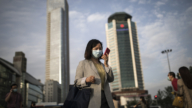【新唐人2013年06月17日訊】美國一份報告顯示,來自中國大陸的移民血液中,重金屬含量都遠遠超過其他亞洲地區的移民。報告指出,這可能與中國人的飲食有關。報告說,這一情況令人堪憂。同時,大陸官方的食品專家指出,由於環境污染造成的食品安全問題,將導致大陸「食源性疾病」隨時面臨爆發的風險。
一項由美國疾病控制和預防中心健康統計部門完成的調查顯示,來自中國大陸的移民血液中,鉛、鎘、汞等重金屬含量,一概高於來自其他亞洲地區的移民,其中的鉛含量,更是高出44%。報告中說,這可能與中國人的飲食習慣有關。
5月,大陸各地爆發「鎘大米」危機。
重慶食品工業研究所副所長周令國:「大氣污染、土壤污染、環境污染,它本身這個重金屬可能被這些植物吸收的,吸收之後,在植物中間存在,然後人食用之後,它可能在人體內積淤起來,這些都是污染源。現在我們的糧食、或者蔬菜,或者茶葉這些植物中,受污染的地區比較嚴重的。」
中共當局2010年曾經發佈報告說,中國五分之一的耕地都受到了重金屬污染,其中鎘污染和砷污染佔40%,主要集中在湖南、江西等長江以南的地區。「南京農業大學農業資源與生態環境研究所」所長潘根興團隊,在全國多個縣級以上市場隨機採購樣品,結果發現大米的鎘超標現象極為嚴重。
南京農業大學農業資源與生態環境研究所所長 潘根興:「我們原來的研究,說明污染的問題,其實在生產上可能會有大面積的發生。通過採樣來講,在污染地區超標率很高,要達到百分之七十多。」
近期,大陸國土資源局放出消息說,通過正在繪製的土壤重金屬污染圖發現,大陸重金屬污染面積有顯著擴大,並向東部人口密集區擴散。
另外,有評論指出,大陸的環境污染對人體健康的危害,正在通過「食源性疾病增長」反映出來。「食源性疾病」是指﹕通過攝食進入人體的有毒、有害物質造成的疾病,如食物中毒、腸道傳染病等。這類疾病的發病率居各類疾病總發病率的前列,是當前世界上最突出的衛生問題。
周令國:「這個食品中間受了污染,受了重金屬、農藥這些污染,受了外來的化學物質或者是微生物的污染,它本身就不適用了,人吃了之後,可能對人的身體健康造成危害,這是不安全的因素。」
還有評論認為,在今後相當長的一段時間內,當局過去不計後果高速發展工業,在這過程中污染環境而積纍的問題,將會面臨一個相對集中的爆發期,各種惡果將相繼顯現,其中「食源性疾病」會爆發到甚麼程度﹖目前還難以預計﹗
專家認為,造成「食源性疾病」的因素,除了環境污染之外,另一個主要的原因就是﹕非法食品加工和食品添加,也就是我們常說的「毒食品」,例如毒奶粉、鎘大米、地溝油以及最近出現的毒皮蛋等。而造成這些「毒食品」在大陸氾濫的主要原因則是﹕當局的縱容和社會道德的缺失。
周令國:「現在強調食品中的污染物,有些在加工過程中間,有些不法的加工方法、不當的加工方法、或者是人為的,有些利益驅動人為的亂添加一些東西。」
四川環保人士陳雲飛:「因為很多企業,他們都是領導和官員參與,他們有股份,第二個,那些企業用錢去賄賂一些安檢、質檢部門,他們生產一些食品不安全。」
重慶食品工業研究所副所長周令國認為,只有當局、或企業經營者、或消費者各方,從政策層面、或道德層面共同努力和完善,才能改善中國污染和食品安全問題現狀。
但是,整體環境甚麼時候可以達到完善的標準,恐怕是遙遙無期﹗
採訪編輯/張天宇 後製/葛雷
Notably higher level of heavy metals found in blood of Chinese migrants
According to a U.S. report, migrants from mainland China
have significantly higher levels of heavy metals in their blood
than other Asian migrants.
The report says this worrisome fact can be related to
Chinese dining habits.
Concurrently, Chinese food experts also warn that
massive foodborne illness can break out anytime in China
as food safety problems caused by pollution become worse.
A recent survey conducted by U.S. based Centers for Disease
Control and Prevention shows that blood levels of lead,
cadmium, mercury and other heavy metal are generally
higher among migrants from mainland China than
other Asian countries.
Specifically, blood lead levels are 44% higher among Chinese.
This is speculated to result from Chinese dining habits.
In May, rice contaminated with cadmium was found
in several of China’s provinces.
Zhou Lingguo, deputy director of the Chongqing Research
Institution of Food Industry: “Environmental pollution with
heavy metals in air and soil can both be absorbed by plants.
If consumed by human, those elements can accumulate
inside human body.
Either grains, vegetables or teas can be sources of pollution
as many areas with farmlands have been heavily polluted.”
In 2010, the Chinese Communist Party (CCP) released
a report saying that
20% of China’s farmland has been subject
to heavy metal pollution.
Among them, 40% are polluted with arsenic and cadmium,
which is mostly concentrated in Hunan, Jiangxi and
other provinces south of the Changjiang River.
Head of the Research Center of Agricultural Resource and
Ecology at Nanjing Agricultural University, Pan Genxing and
his group had collected random rice samples from
markets of county level or higher.
They found that the cadmium contamination
problem has become extremely serious.
Pan Genxing, head of the Research Center of Agricultural
Resource and Ecology at Nanjing Agricultural University:
“Our previous research indicates that pollution may be
widespread in agricultural production.
By collecting samples and analyzing them, we found that
in polluted areas the rate of contamination can be over 70%.”
Recently, the CCP’s Ministry of Land and Resources
also made similar reports.
By plotting China’s pollution map of heavy metals,
the ministry claimed that
the polluted area had significantly increased
and was spreading to the eastern regions
which are much more densely populated.
In addition, experts also warn that China’s environmental
pollution is doing harm to people’s health through foodborne illness.
“Foodborne illness” refers to any illness resulting from
one’s eating contaminated food or poisonous chemicals.
Food poisoning and Intestinal infection are
two examples of foodborne illness.
This is the most commonly seen type of illness, and it is thus
one of the prominent health problems in the world.
Zhou Lingguo: ”If any food is polluted by heavy metal,
pesticide, chemicals or parasites during the process
of production, it is no longer safe.
If people eat them, it may do harm to human health,
which is an unsafe factor to their lives.”
Commentators say that China will see a outbreak period of
the pollution problem for a long time in the future.
This is a result of the Chinese Communist party’s reckless
development of industry and many disastrous effects will manifest.
Currently it is hard to predict to what extent
foodborne illness will break out.
Experts also remark that, besides pollution, another major
factor leading to foodborne illness is illegal food processing and poisonous food additives.
This is responsible for various well-known “poisonous foods”,
such as “poisonous milk”, “cadmium-contaminated rice”,
“gutter oil”, as well as the “poisonous century eggs”
which were most recently uncovered.
More importantly, it is the CCP’s connivance and
demoralization of the whole society that fuels the spread of
those poisonous foods in China.
Zhou Lingguo: ”Talking about the food pollutants,
some are added through illegal or improper processing,
while others, such as artificial ingredients,
are intentionally added for profits.”
Chen Yunfei, environmentalist from Sichuan:
”The causes are, for one:
Governmental leaders or officials hold shares in many
food companies.
Secondly, some companies can bribe departments
of food safety or quality.
By doing these they can produce these unsafe foods
without being inspected.”
Zhou Lingguo believes that, to solve China’s pollution
and food safety problems, the government,
food company operators and consumers must work
together toward either more effective policies or improved social morality.
However, when will the overall environment
be improved to an acceptable level?
The answer is probably not within any foreseeable future.




























